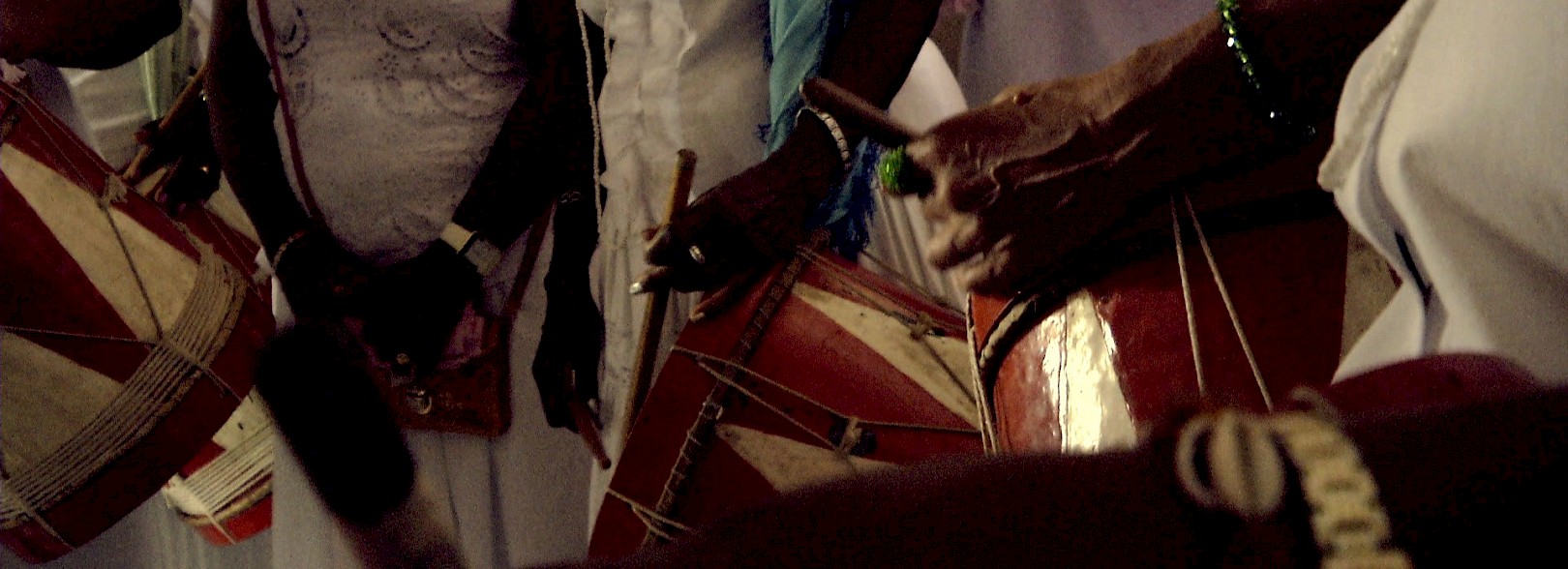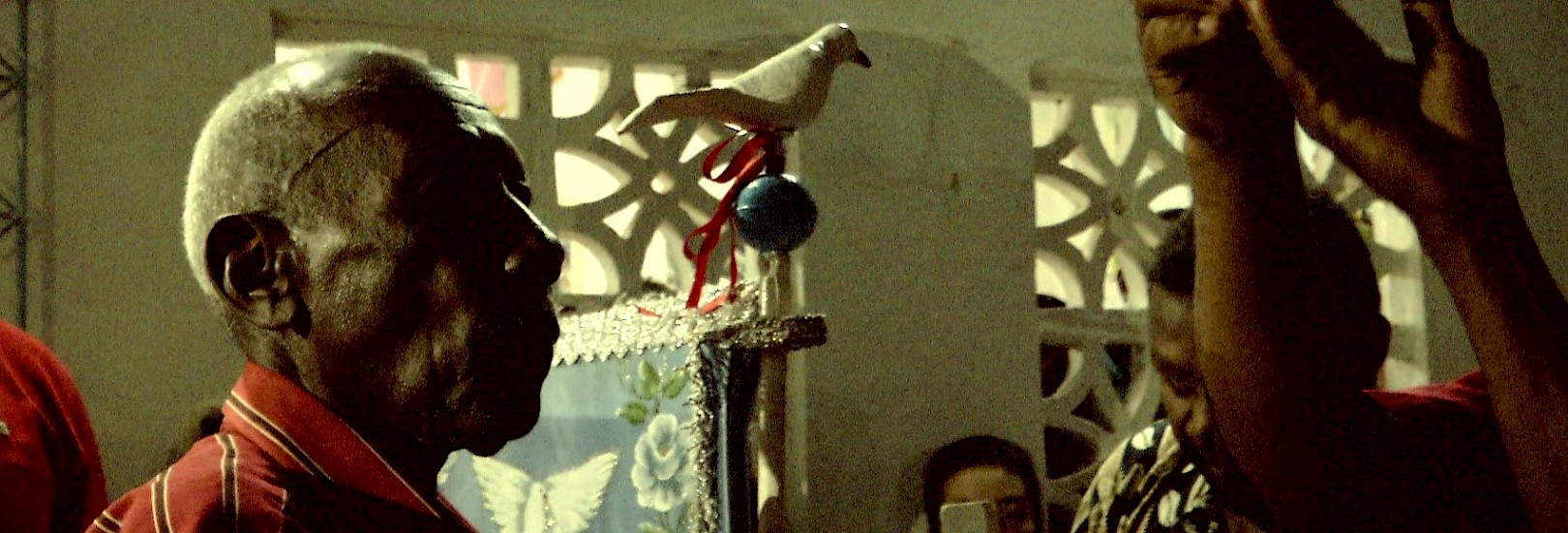Album
The Divine Festivities of Casa Fanti Ashanti
Ever since this son of Oxalá was six years old and went into trance for the first time, his name has been echoing from the jungle to the city, from the Africas to Brazil, from São Luís in Maranhão to the world. Father Euclides 'Talabyian' – his introduction to Candomblé came at thirteen in the Terreiro do Egito, at seventeen he already took requests and wishes, and in 1954 he started building the Fanti Ashanti house. From the Tambor de Mina to the Candomblé Jejê-Nagô, everything in this descendant from African slaves’ home had to go through him and his hands, which gave so much throughout the years: ten books, hundreds of handmade heads, clothes and garments were sewn, drums rolled. Everything to leave a mark and tracks: self-taught, he’d always wanted to prevent the path of his own from being erased by the prejudice of the many.
"My university is time”
Father Euclides, from the book ‘Pedra da Memória’ by researcher and musician Renata Amaral

At this address in the Cruzeiro do Anil neighborhood, a window and a horizon for history, he actually built a great hub of barely-known Brazils: so much so that the place was given the title of Ponto Cultural (Cultural Hub) in 2006. In its annual calendar, there are Tambor de Mina and Candomblé classes and practices, as well as Pajelança, Baião de Princesa, Samba Angola, Mocambo, Tambor de Crioula, Tambor de Taboca, Canjerê, Bancada, Bumba-meu-Boi, Festa do Divino.
"I don’t like the word tradition, I like the word habit.
I speak of habit when explaining about the affairs of the ancient"
Father Euclides

From the beat of his sisters Dindinha, Zezé and Graça, his niece Bartira and of so many other women from Maranhão state in his terreiro - comes one of the most important of these celebrations. The Festa do Divino Espírito Santo (Divine Holy Spirit Festivities) seems to have originated from a banquet served by a child, a boy emperor of the world, to the prisoners in a jail. The party was banished in Portugal for being too libertarian, but survived in the archipelago of Açores in the form of a version closer to the Catholic doctrines. It might have ended up in Brazilian territory from that point: it is now one of the main manifestations of Catholic faith in the country.
In the 1850s, the habit was rooted into the city of Alcântara in Maranhão state, where it spilled onto the rest of the state, mainly to occupy the main halls at the terreiros. Once magic is turned into beauty: a pagan ritual adapted by European Catholicism that, in the Northeast of Brazil, resisted in the pulse of the poor and in the ceremonies of black people. And in the hands of women: the Caixeiras do Divino are fundamental characters in this celebration. They play their instrument called caixa (snare drum), dance, and supervise every detail and preparation for the celebration: they make processions and tributes to the Holy Spirit, sing and celebrate boy emperors.

At the Divino celebrations, music is the great link between the rhythm of the works and the practice of spirituality. Playing the caixas is a science passed on from female generation to female generation. And the whole ritual revolves around the empire of the children: dressed as noblemen for some days, their families make great effort to meet all the garment, ornament, and food requirements for the parties. Otherwise simple throughout the year, this is the time of the year when they are the families of kings, deserving of all types of perks. Each year, a new couple of emperors emerge: used to collaborating, the community shares the opportunity to occupy a prominent place in the tribune.

Ornate as a palace with a Holy Spirit dove at its center, Fanti Ashanti dresses in ribbons for a fortnight in July for each stage of the party: the opening of the tribune, the search and raising of the mast, visiting empires, processions around town, re-gifting of royal possessions to the following years’ kings, the closing of the tribune, and the Carimbó das Caixeiras.
"I will say goodbye
With an aching heart
I say goodbye to the Divine
And to all of Maranhão"
Song by the Caixeiras do Divino from Maranhão state

Father Euclides’ firm grip shall remain in every detail. From the heads he made, to the multiplication of the fundamentals. From the hands of his nine children and so many sisters: the diligence of those who have faith in the mundane. His was last seen contemplating Dindinha while she sang a song at the 2015 Divino celebrations: days later, the news that his heart had been enchanted came out. But his hot seeds walk the world and write, upon artistic lines, his ancestry. Now he lives in the swirls of a caboclo who spins the recognition of Talabyian, he who knew how to build walls to keep the invisible within the reach of one’s touch.
ritual
Casa Fanti Ashanti (part 1)
16:29
ritual
Casa Fanti Ashanti (part 2)
15:02
ritual
Casa Fanti Ashanti (part 3)
09:44
ritual
Casa Fanti Ashanti (part 4)
12:44
outtake
Festa do Divino at the Terreiro das Portas Verdes
18:27
